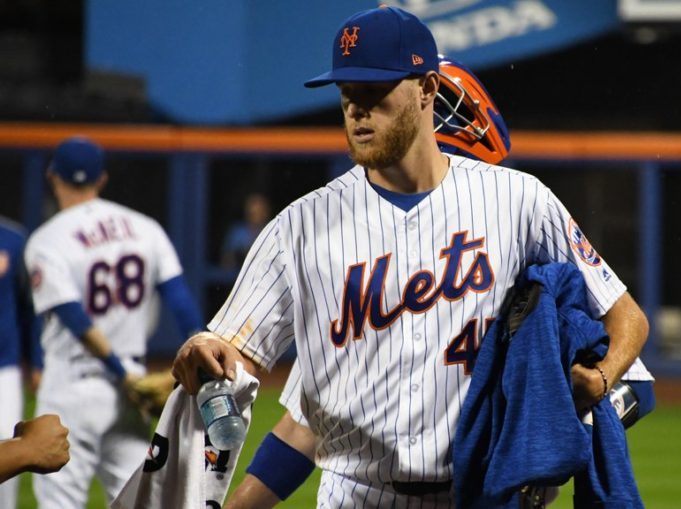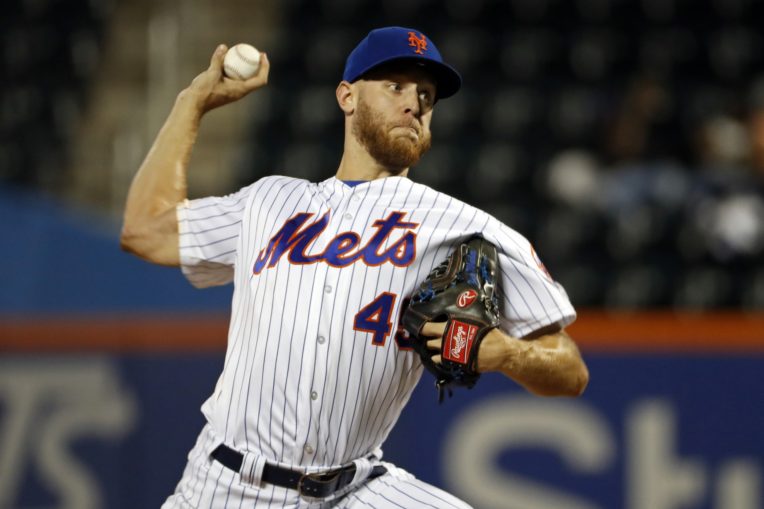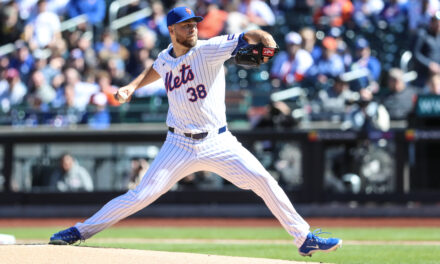Zack Wheeler‘s rip-roaring comeback season reached new heights last night, as the righty twirled eight shutout innings while striking out seven and walking none en route to a 13-0 beatdown of the Miami Marlins last night. Wheeler last eclipsed eight frames on June 19, 2014, when he pulled off a complete game, three-hit shutout in Miami. At 87 last night, his game score checked in as the second-highest mark in his career (just one point below that of his first shutout)
Wheeler’s season ERA now sits at 3.23 – the ninth best in the National League. He owns an even more outstanding 1.32 second-half figure, which ties with Pittsburgh right-hander Trevor Williams for the best such line in the major leagues. The .255 opponent SLG in that span is now tied for the lowest in the majors alongside Red Sox southpaw David Price.
Against a five-hour rain delay, no less, Wheeler was still able to rub up a ball and take down his competition as he came away with his league-leading eighth win of the second half. His night controversially ended at just 89 pitches (61 strikes), with Paul Sewald notching the final three outs of the evening.
While the decision from manager Mickey Callaway to pull Wheeler despite the crystal clear lane certainly seemed reprehensible, the fact remains that Wheeler finished his eighth inning of work with a chance to wrap up the Mets’ first complete game of fewer than 100 pitches since John Maine in 2006. He had all the pitches lined up in his arsenal to pull it off, but took a step down as the clock struck midnight on a long, wet night that had knocked him out cold.
“We talked to him in-between innings. He was tired,” Callaway admitted in the postgame press conference. “He just indicated like he didn’t want to go back out. His velo had been a little down all day… the six-hour wait and all that kind of took its toll.”
Save for a seventh inning that saw Miami load the bases full of singles and required 21 pitches altogether, Wheeler never shelled out more than 11 pitches in a single frame, keeping opposing hitters pinned under his thumb with a craftily-spotted fastball and a liberally-deployed curveball to allow just one other hit on the entire night.
The seventh, which was far and away his hardest inning, saw his fastball velocity dip into the range of 93-94 mph – a stark drop-off from his typical 97-98. Dave Eiland paid the righty a visit a few minutes after Tomas Nido dropped a foul popup to prolong the inning, and evidently turned on a switch that Wheeler used to his advantage through the rest of his night. He began by inducing a 5-4-3 double play off the bat of Lewis Brinson to end the seventh, and used just eight pitches in the eighth inning, laying waste to Austin Dean on three to retire the side in order and cap off a night that, even then, looked far from over.
While dominance has been a part of Wheeler’s game over the last three months or so, efficiency has slowly started to define his latter starts, which have seen some of his best results this season – as was the case two weeks ago in San Francisco and again last week when he went toe-to-toe against the white-hot Los Angeles Dodgers. Last night’s efforts – admittedly against a battered and defenseless Marlins lineup – seemed the perfect culmination.
After he allowed a leadoff single to JT Riddle in the third inning, Wheeler managed three outs in a sequence of six proceeding pitches to strand him at second base without skipping a beat. While no such outs came on a strikeout, the narrative changed in the fourth, when he beat veteran second baseman Starlin Castro with a 97 mph fastball on the black before dismembering All-Star catcher J.T. Realmuto on a pair of curveballs and an almost identical fastball.
Similar to the likes of Jacob deGrom and his three fastballs against Javier Baez and the Chicago Cubs just weeks back, the brash attack method from Wheeler worked wonders against some notably tough outs, even by the Marlins’ standards. While he’s no MVP, Derek Dietrich and his career .300/.412/.488 line against Met pitching accepted a seat in a matter of three inside fastballs in the second inning.
“I just felt really good today,” Wheeler said after the game. “I was throwing a lot of pitches for strikes. The changeup was working really well today, so was the curveball…”
Having established that the decision to keep Wheeler out of the ninth inning was solely driven by basic fatigue, last night certainly offered some good perspective as to his growth not only as a pitcher, but also as a competitor. The conviction that we’ve seen from arms like Steven Matz, Seth Lugo, and Robert Gsellman are all clear attributes to the work of the coaching staff, but Wheeler’s particular ascension from a fringe starter in Vegas at the beginning of the year to a clear top-of-the-line arm has been the most resonant. He continues to deal on the mound, and his efforts have been rightfully rewarded.

















